浅谈中西语言文化差异
从英汉语言视角探析中西方文化差异
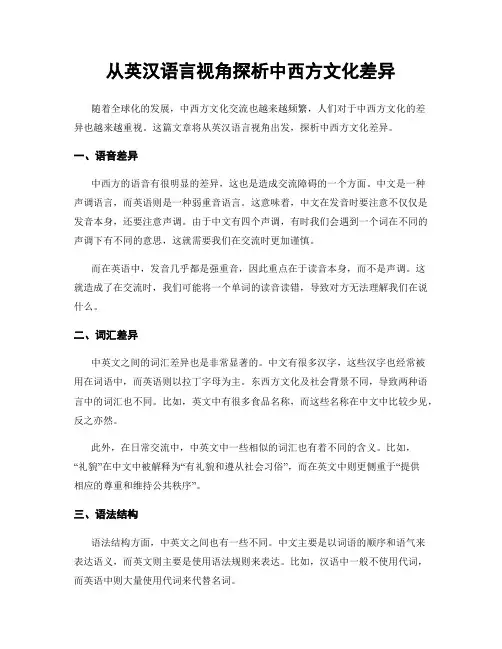
从英汉语言视角探析中西方文化差异随着全球化的发展,中西方文化交流也越来越频繁,人们对于中西方文化的差异也越来越重视。
这篇文章将从英汉语言视角出发,探析中西方文化差异。
一、语音差异中西方的语音有很明显的差异,这也是造成交流障碍的一个方面。
中文是一种声调语言,而英语则是一种弱重音语言。
这意味着,中文在发音时要注意不仅仅是发音本身,还要注意声调。
由于中文有四个声调,有时我们会遇到一个词在不同的声调下有不同的意思,这就需要我们在交流时更加谨慎。
而在英语中,发音几乎都是强重音,因此重点在于读音本身,而不是声调。
这就造成了在交流时,我们可能将一个单词的读音读错,导致对方无法理解我们在说什么。
二、词汇差异中英文之间的词汇差异也是非常显著的。
中文有很多汉字,这些汉字也经常被用在词语中,而英语则以拉丁字母为主。
东西方文化及社会背景不同,导致两种语言中的词汇也不同。
比如,英文中有很多食品名称,而这些名称在中文中比较少见,反之亦然。
此外,在日常交流中,中英文中一些相似的词汇也有着不同的含义。
比如,“礼貌”在中文中被解释为“有礼貌和遵从社会习俗”,而在英文中则更侧重于“提供相应的尊重和维持公共秩序”。
三、语法结构语法结构方面,中英文之间也有一些不同。
中文主要是以词语的顺序和语气来表达语义,而英文则主要是使用语法规则来表达。
比如,汉语中一般不使用代词,而英语中则大量使用代词来代替名词。
此外,在英语中有些句子可以省略主语和动词,而中文中这种省略则很少出现。
这也是造成误解的一个方面。
英语中的省略构成了口语化的特点,使得英语的交流更加快速和简洁。
四、文化背景最后,中西方文化之间的差异也必须考虑到。
中西方文化中有很多不同的观念和价值观,也影响了两种语言的使用。
比如,西方文化倾向于更加个人主义,而中国文化则主张全体积极地为社会和集体服务。
另外,中西方在交流时的默契程度也有一定区别。
西方文化倡导直截了当地表达自己的观点,而中国文化则更注重保持面子和尊重对方。
浅谈中西方文化差异对跨文化交际的影响
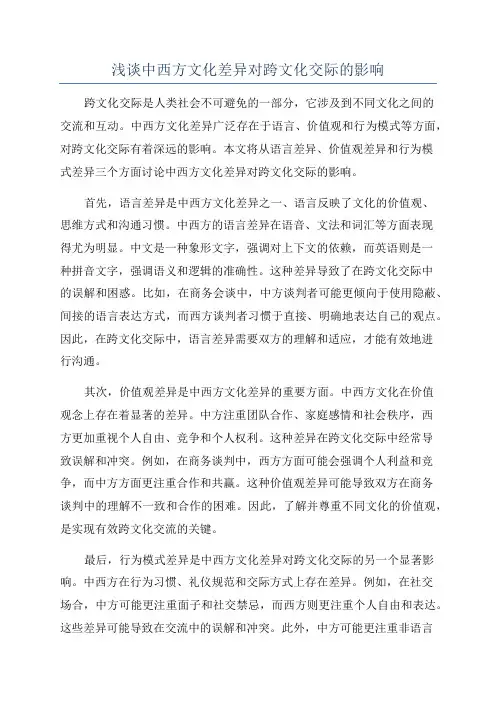
浅谈中西方文化差异对跨文化交际的影响跨文化交际是人类社会不可避免的一部分,它涉及到不同文化之间的交流和互动。
中西方文化差异广泛存在于语言、价值观和行为模式等方面,对跨文化交际有着深远的影响。
本文将从语言差异、价值观差异和行为模式差异三个方面讨论中西方文化差异对跨文化交际的影响。
首先,语言差异是中西方文化差异之一、语言反映了文化的价值观、思维方式和沟通习惯。
中西方的语言差异在语音、文法和词汇等方面表现得尤为明显。
中文是一种象形文字,强调对上下文的依赖,而英语则是一种拼音文字,强调语义和逻辑的准确性。
这种差异导致了在跨文化交际中的误解和困惑。
比如,在商务会谈中,中方谈判者可能更倾向于使用隐蔽、间接的语言表达方式,而西方谈判者习惯于直接、明确地表达自己的观点。
因此,在跨文化交际中,语言差异需要双方的理解和适应,才能有效地进行沟通。
其次,价值观差异是中西方文化差异的重要方面。
中西方文化在价值观念上存在着显著的差异。
中方注重团队合作、家庭感情和社会秩序,西方更加重视个人自由、竞争和个人权利。
这种差异在跨文化交际中经常导致误解和冲突。
例如,在商务谈判中,西方方面可能会强调个人利益和竞争,而中方方面更注重合作和共赢。
这种价值观差异可能导致双方在商务谈判中的理解不一致和合作的困难。
因此,了解并尊重不同文化的价值观,是实现有效跨文化交流的关键。
最后,行为模式差异是中西方文化差异对跨文化交际的另一个显著影响。
中西方在行为习惯、礼仪规范和交际方式上存在差异。
例如,在社交场合,中方可能更注重面子和社交禁忌,而西方则更注重个人自由和表达。
这些差异可能导致在交流中的误解和冲突。
此外,中方可能更注重非语言交流,比如面部表情、身体语言和姿态,而西方则更注重语言表达。
这种行为模式差异需要双方的互相理解和适应,才能促进有效的跨文化交流。
总结起来,中西方文化差异对跨文化交际产生了重要的影响。
语言差异、价值观差异和行为模式差异是中西方文化差异的主要方面,它们在跨文化交际中经常导致误解、冲突和困惑。
浅谈中西方文化差异
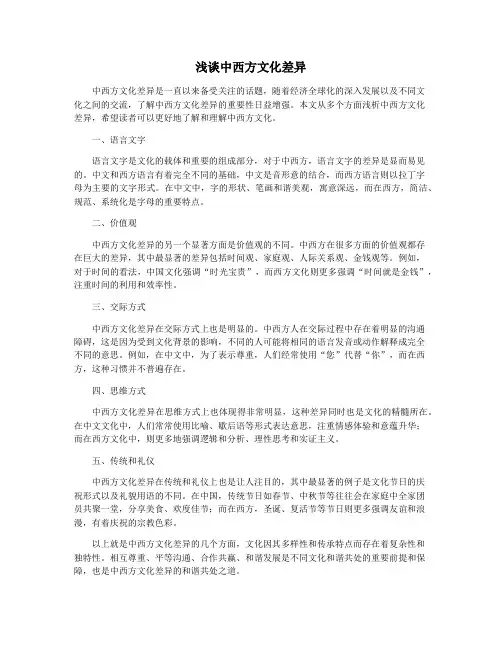
浅谈中西方文化差异中西方文化差异是一直以来备受关注的话题,随着经济全球化的深入发展以及不同文化之间的交流,了解中西方文化差异的重要性日益增强。
本文从多个方面浅析中西方文化差异,希望读者可以更好地了解和理解中西方文化。
一、语言文字语言文字是文化的载体和重要的组成部分,对于中西方,语言文字的差异是显而易见的。
中文和西方语言有着完全不同的基础,中文是音形意的结合,而西方语言则以拉丁字母为主要的文字形式。
在中文中,字的形状、笔画和谐美观,寓意深远,而在西方,简洁、规范、系统化是字母的重要特点。
二、价值观中西方文化差异的另一个显著方面是价值观的不同。
中西方在很多方面的价值观都存在巨大的差异,其中最显著的差异包括时间观、家庭观、人际关系观、金钱观等。
例如,对于时间的看法,中国文化强调“时光宝贵”,而西方文化则更多强调“时间就是金钱”,注重时间的利用和效率性。
三、交际方式中西方文化差异在交际方式上也是明显的。
中西方人在交际过程中存在着明显的沟通障碍,这是因为受到文化背景的影响,不同的人可能将相同的语言发音或动作解释成完全不同的意思。
例如,在中文中,为了表示尊重,人们经常使用“您”代替“你”,而在西方,这种习惯并不普遍存在。
四、思维方式中西方文化差异在思维方式上也体现得非常明显,这种差异同时也是文化的精髓所在。
在中文文化中,人们常常使用比喻、歇后语等形式表达意思,注重情感体验和意蕴升华;而在西方文化中,则更多地强调逻辑和分析、理性思考和实证主义。
五、传统和礼仪中西方文化差异在传统和礼仪上也是让人注目的,其中最显著的例子是文化节日的庆祝形式以及礼貌用语的不同。
在中国,传统节日如春节、中秋节等往往会在家庭中全家团员共聚一堂,分享美食、欢度佳节;而在西方,圣诞、复活节等节日则更多强调友谊和浪漫,有着庆祝的宗教色彩。
以上就是中西方文化差异的几个方面,文化因其多样性和传承特点而存在着复杂性和独特性。
相互尊重、平等沟通、合作共赢、和谐发展是不同文化和谐共处的重要前提和保障,也是中西方文化差异的和谐共处之道。
浅谈中西语言文化差异
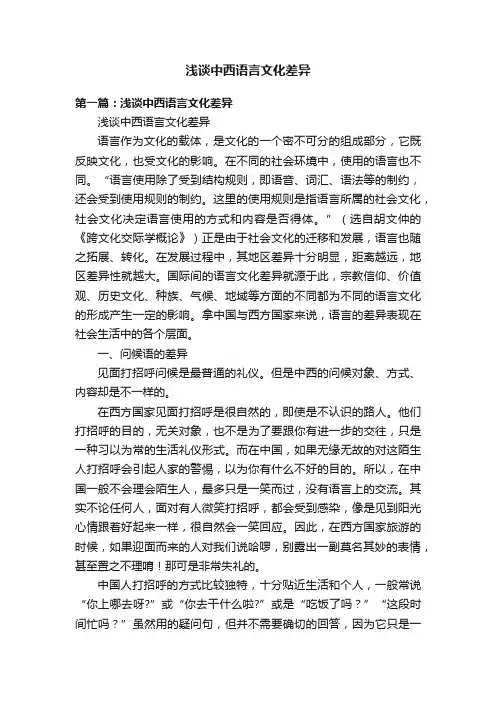
浅谈中西语言文化差异第一篇:浅谈中西语言文化差异浅谈中西语言文化差异语言作为文化的载体,是文化的一个密不可分的组成部分,它既反映文化,也受文化的影响。
在不同的社会环境中,使用的语言也不同。
“语言使用除了受到结构规则,即语音、词汇、语法等的制约,还会受到使用规则的制约。
这里的使用规则是指语言所属的社会文化,社会文化决定语言使用的方式和内容是否得体。
”(选自胡文仲的《跨文化交际学概论》)正是由于社会文化的迁移和发展,语言也随之拓展、转化。
在发展过程中,其地区差异十分明显,距离越远,地区差异性就越大。
国际间的语言文化差异就源于此,宗教信仰、价值观、历史文化、种族、气候、地域等方面的不同都为不同的语言文化的形成产生一定的影响。
拿中国与西方国家来说,语言的差异表现在社会生活中的各个层面。
一、问候语的差异见面打招呼问候是最普通的礼仪。
但是中西的问候对象、方式、内容却是不一样的。
在西方国家见面打招呼是很自然的,即使是不认识的路人。
他们打招呼的目的,无关对象,也不是为了要跟你有进一步的交往,只是一种习以为常的生活礼仪形式。
而在中国,如果无缘无故的对这陌生人打招呼会引起人家的警惕,以为你有什么不好的目的。
所以,在中国一般不会理会陌生人,最多只是一笑而过,没有语言上的交流。
其实不论任何人,面对有人微笑打招呼,都会受到感染,像是见到阳光心情跟着好起来一样,很自然会一笑回应。
因此,在西方国家旅游的时候,如果迎面而来的人对我们说哈啰,别露出一副莫名其妙的表情,甚至置之不理唷!那可是非常失礼的。
中国人打招呼的方式比较独特,十分贴近生活和个人,一般常说“你上哪去呀?”或“你去干什么啦?”或是“吃饭了吗?”“这段时间忙吗?”虽然用的疑问句,但并不需要确切的回答,因为它只是一种问候方式,为了表示看见了对方,以此语代替一切语言,不代表问题本身。
但是在西方国家看来,这是想要探知别人隐私的失礼行为。
如果你一见面就问:“你吃饭了吗?”他们往往会误解成你要请他们一起用餐。
浅谈东西方语用文化的差异
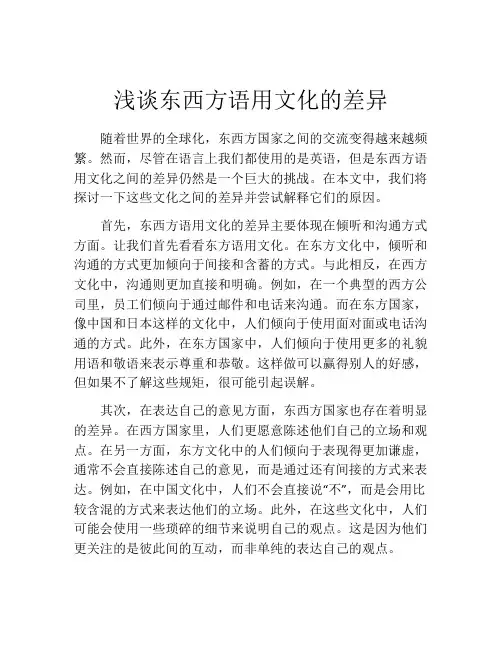
浅谈东西方语用文化的差异随着世界的全球化,东西方国家之间的交流变得越来越频繁。
然而,尽管在语言上我们都使用的是英语,但是东西方语用文化之间的差异仍然是一个巨大的挑战。
在本文中,我们将探讨一下这些文化之间的差异并尝试解释它们的原因。
首先,东西方语用文化的差异主要体现在倾听和沟通方式方面。
让我们首先看看东方语用文化。
在东方文化中,倾听和沟通的方式更加倾向于间接和含蓄的方式。
与此相反,在西方文化中,沟通则更加直接和明确。
例如,在一个典型的西方公司里,员工们倾向于通过邮件和电话来沟通。
而在东方国家,像中国和日本这样的文化中,人们倾向于使用面对面或电话沟通的方式。
此外,在东方国家中,人们倾向于使用更多的礼貌用语和敬语来表示尊重和恭敬。
这样做可以赢得别人的好感,但如果不了解这些规矩,很可能引起误解。
其次,在表达自己的意见方面,东西方国家也存在着明显的差异。
在西方国家里,人们更愿意陈述他们自己的立场和观点。
在另一方面,东方文化中的人们倾向于表现得更加谦虚,通常不会直接陈述自己的意见,而是通过还有间接的方式来表达。
例如,在中国文化中,人们不会直接说“不”,而是会用比较含混的方式来表达他们的立场。
此外,在这些文化中,人们可能会使用一些琐碎的细节来说明自己的观点。
这是因为他们更关注的是彼此间的互动,而非单纯的表达自己的观点。
最后,语言的直接性也是一个重要的问题。
在东方语言中,人们更喜欢使用隐喻和比喻来表达自己的意思。
这些隐喻和比喻通常是由某些特殊的文化、历史及传统的背景支持的。
而在西方语言中,人们倾向于使用更加直接、干净利落的语言,这样会让他们在交流过程中更加明确和直接。
那么这些东西方语用文化之间的差异究竟起源于何处?主要的原因是东方文化和西方文化对人际关系的看法以及沟通方式的不同。
在东方文化中,人们更加注重彼此间的关系,而不是单纯的表达自己的意见。
相比之下,西方文化中的人们则更加注重自己的利益和意见。
此外,这种文化差异也可能归因于不同文化形成背景的差异。
浅析中西方文化的差异性
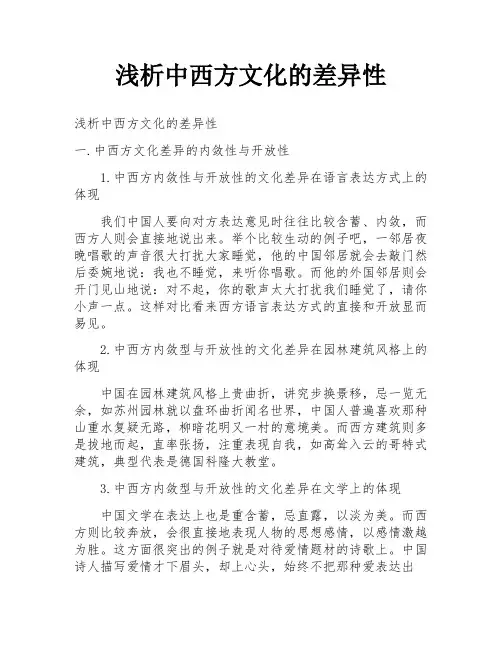
浅析中西方文化的差异性浅析中西方文化的差异性一.中西方文化差异的内敛性与开放性1.中西方内敛性与开放性的文化差异在语言表达方式上的体现我们中国人要向对方表达意见时往往比较含蓄、内敛,而西方人则会直接地说出来。
举个比较生动的例子吧,一邻居夜晚唱歌的声音很大打扰大家睡觉,他的中国邻居就会去敲门然后委婉地说:我也不睡觉,来听你唱歌。
而他的外国邻居则会开门见山地说:对不起,你的歌声太大打扰我们睡觉了,请你小声一点。
这样对比看来西方语言表达方式的直接和开放显而易见。
2.中西方内敛型与开放性的文化差异在园林建筑风格上的体现中国在园林建筑风格上贵曲折,讲究步换景移,忌一览无余,如苏州园林就以盘环曲折闻名世界,中国人普遍喜欢那种山重水复疑无路,柳暗花明又一村的意境美。
而西方建筑则多是拔地而起,直率张扬,注重表现自我,如高耸入云的哥特式建筑,典型代表是德国科隆大教堂。
3.中西方内敛型与开放性的文化差异在文学上的体现中国文学在表达上也是重含蓄,忌直露,以淡为美。
而西方则比较奔放,会很直接地表现人物的思想感情,以感情激越为胜。
这方面很突出的例子就是对待爱情题材的诗歌上。
中国诗人描写爱情才下眉头,却上心头,始终不把那种爱表达出来,而西方诗人会高喊你是我的太阳,爱情之火烧得我浑身焦灼。
这种直言不讳是中国人很难接受的,产生差异的实质在于彼此的审美取向不同。
也正因为如此本文由收集整理,当我们把某些中国经典文学作品,尤其是诗歌,翻译成英语时往往会狼狈不堪。
因为要把那些含蓄深藏的情感一一挖出来,数明白,不免显得有些奇怪和唐突。
二. 中西方文化差异的形象概括性与实证严谨性1.中西方形象概括性与实证严谨性的文化差异在语言结构上的体现我们中国人说话一般都带有很强的随意性,比如我们见面打招呼时常说:吃了吗?还有如你来了,我走看看吧等简练的语言都反映出中国文化重视思想意念的心领神会,不强求语言形式,注重直观感受和形象概括。
相对来说,西方的语言就较为严谨,例如这个英文句子If you're stuck with someone and feeling tongue-tied,console yourself by remembering that the other person may be feeling as agonized as you.,乍一看语言表达比较繁琐,要一层层分析才能明白意思,反映了西方文化在语言结构上具有很强的严谨性。
中英习语的文化差异及其翻译方法
中英习语的文化差异及其翻译方法习语是每个语言都不可或缺的一部分,它们是人们日常交流的重要组成部分,也是语言和文化的体现。
由于中西文化的不同,中英习语之间存在着一些差异。
在进行翻译时,常常会遇到一些难题。
本文将就中英习语的文化差异及其翻译方法进行探讨。
一、中英习语的文化差异中英习语的文化差异主要表现在以下几个方面:1. 文化背景差异:中西方文化背景的差异导致了中英习语的不同。
“一箭双雕”在中国习语中表示一举两得,而在英语中可能用“kill two birds with one stone”来表达同样的意思。
2. 传统习惯差异:中西方的传统习惯也影响着习语的表达方式。
“千里之行,始于足下”这个中国谚语,表达了行动的重要性,而在英语中可能会用“a journey of a thousand miles begins with a single step”来表达同样的观念。
3. 历史文化差异:中国拥有悠久的历史和文化,所以中文中的许多习语都源自古代的故事、典故或者传说。
“不翼而飞”就是一例,它出自《诗经》中的《小雅·鹤鸣》:“鹤鸣于九皋,声闻于野。
非不说子,自有先焉。
不翼而飞,沉水而止。
”而在英语中,由于历史文化不同,习语常常与西方的历史和神话有关。
以上内容表明,中英习语的文化差异存在于语言的表达方式、内涵和源头等方面,这给中英习语的翻译带来了一定的难度。
二、中英习语的翻译方法针对中英习语的文化差异,我们在翻译时需要采取一些对应的方法来保持习语的原汁原味,也要使其容易为目标语言的读者接受。
以下是一些翻译方法:1. 直译法直译法是最常见的中英习语翻译方法,它在尽量保留习语原意的基础上,用目标语言中与之相类似的习语来替换。
中文中的“九牛一毛”在英语中可以直译为“a drop in the bucket”。
2. 动态对等法动态对等法是相对灵活的一种翻译方法,它不是简单地对习语进行翻译,而是根据习语的内涵和文化特色,选用目标语言中更具有表现力和文化内涵的习语。
中西方语言差异总结三篇
中西方语言差异总结三篇【篇1】中西方语言差异总结一、中西思维方式差异对语言的影响1.思维立足他方与己方的差异。
中国人善于换位思考,习惯站在对方的角度考虑问题,注重对方的感受。
出于礼貌,或者想跟人套近乎,中国人总是愿意说些关心人的话,如你一定累了,好好休息一下吧(Youmustbetired.Haveagoodres)t 。
然而,这却可能让西方人误解为你对其身体状况表示担忧。
西方人很喜欢别人夸自己年轻、强壮,如果质疑其健康状况,他们是会很介意的。
西方人思维一般都是立足自身,直接谈自己的意愿或感受。
好多英语国家的服务员招呼顾客时,经常用CanIhelpyou(我能为你做点什么?),这是一个很好的体现。
2.思维方向顺序与逆序的差异。
中国人偏重顺序思维,汉语对与时间和空间有关的各因素排列,一般都是由大到小、由整体到个体,句子以时间和事理为线索,按照实际的时序及事序来安排。
而西方人习惯逆序思维,英语句子虽然也可遵循时间先后顺序,但不总是如此。
它可以打破时间先后顺序来安排,有着丰富的形态变化,句子呈句尾开放式。
3.思维表达婉转与直接的差异。
中国人习惯于形象思维,西方人习惯于逻辑思维。
在语言上,中国人在说明问题时会运用比喻、暗示的方法,让人们产生联想,以达到某种寓意。
而英语正相反,它比较直接,直奔主题,然后加上修饰成分,定语一般放在中心词的后面,状语一般放在动词之后,尽管偶尔也可以状语前置。
二、中西文化差异对日常用语的影响1.在称呼方面中国人比较注重礼节,会根据对方的身份、与自己的亲疏关系以及不同场合,使用不同的称谓,以示敬意。
但是在西方,不管是在正式还是非正式场合,都喜欢用名字称呼别人。
2.在致谢方面中国家庭成员之间很少用谢谢,中国人认为对家里人或者好朋友的帮助是one sownobligation,noneedtothankorbethanked,彼此根本不必说谢谢,说了反而显得生分。
而西方人对家人或者朋友的帮忙都习惯说谢谢, Thankyou 几乎用于一切场合,在所有人之间,即使父母与子女、兄弟姐妹之间也不例外。
从语言方面看中西方文化差异
从语言方面看中西方文化差异语言是社会的产物,是人类历史和文化的结晶。
它凝聚着一个民族世代相传的社会意识,历史文化,风俗习惯等各方面人类社会所有的特征。
不同的文化背影和文化传统,使中西方在思维方式,价值观念,行为准则和生活方式等方面也存在有相当的文化差异。
透一管可窥全豹,我就从语言方面来谈谈中西方的文化差异:1称谓及称呼: 学习英语时,我们不难发现英语中的称谓名称比汉语中的要少得多,例如,英语中cousin一词,对应于汉语的表兄、表弟、表姐和表妹等。
我们看到,汉语把表亲关系区分得非常严格,既要说出性别,又要分出大小,根本不像英语笼统一个词了事。
这种语言现象的产生归因于中国二、三千年之久的封建统治。
这种封建社会高度重视血缘关系,特别强调等级间的差异,提倡长幼、尊卑有序。
亲属关系亲疏,长幼和性别等万面不同,权力和义务也随着出现区别,故称谓区分得严格而细密。
英语中的称谓为数不多,除 dad, mum, grandpa, aunt, uncle等几个称谓经常使用外,其它的几乎都不用。
在汉语里,一般只有彼此熟悉亲密的人之间才可以“直呼其名”。
但在西方,“直呼其名”比在汉语里的范围要广得多。
在家庭成员之间,不分长幼尊卑,一般可互称姓名或昵称。
比如: 小孩子在家里,可以直接叫爸爸、妈妈的名字。
不把爷爷奶奶称作grandpa和grandma,而是直呼其名,这种做法却是得体,亲切、合乎常理的。
在西方,常用“先生”和“夫人”来称呼不知其名的陌生人,对十几或二十几岁的女子可称呼“小姐”,结婚了的女性可称“女士”或“夫人”等。
对所有的男性长辈都可以称“叔叔”,对所有的女性长辈都可以称“阿姨”。
年轻人称老年人,只在其姓氏前加 Mr, Mrs 或Miss。
这在我们中国是不行的,必须要分清楚辈分、老幼等关系,否则就会被认为不懂礼貌。
他们这些做法体现了西方人追求人人平等的思想,在他们眼中,称谓本身就意味着不平等。
2、敬语谦词: 像称谓一样,英语中的敬语谦词也远远少于汉语。
中西文化差异及语言体现
中西文化差异及语言体现随着全球化的发展,不同文化的碰撞和交流变得越来越普遍。
中西文化因为历史、地理等原因而有许多差异,在语言中也得到了充分的体现。
本文将探讨中西文化差异及其在语言中的体现。
首先,中西文化在价值观念上存在差异。
中西方文化有不同的核心价值观念,这直接影响到人们的行为方式和思维方式。
中华文化注重礼仪和家庭价值观念,强调孔子的“仁”的思想,重视家庭责任和尊重长辈。
而西方文化注重个人主义和自由,强调个体权利和自我实现。
因此,中西文化在处理人际关系和家庭观念上有着差异。
在语言中,中西文化差异体现在词汇和表达方式上。
中华文化注重尊称的使用,如用“您”而非“你”,用“先生”或“女士”而非直呼其名。
这种尊称反映了对长辈和上级的尊敬,也体现了中华文化中的礼让精神。
而在西方文化中,人们更倾向于直呼其名,不那么注重尊称。
另外,中华文化重视面子和谦虚,因此常使用“谢谢”,“不好意思”等表达方式来传达客气和谦虚。
而在西方文化中,直接表达感谢和道歉是更常见的方式。
其次,中西文化在时间观念上存在差异。
中华文化注重历史和传统,时间观念相对较为长远,有着“天人合一”的思想。
因此,在交流中会使用较多的成语和典故,以警示人们注重历史经验教训。
而在西方文化中,时间观念相对较为短暂,注重即时和效率。
因此,在交流中会更加直接和实用,少使用成语和典故。
在语言中,中西文化差异体现在时间表达方式上。
中华文化中常使用“明天”、“后天”、“大后天”等词汇来表示近期与时间相关的事物。
而在西方文化中,常使用“tomorrow”、“the day after tomorrow”等词汇来表示相同的意思。
这反映出中西方在时间观念上的不同。
中西文化差异还体现在态度和沟通方式上。
中华文化注重间接、含蓄、非言语的沟通方式。
在交流中,人们常使用肢体语言、眼神和微笑来传达信息。
而在西方文化中,人们更倾向于直接和明确的沟通方式,更注重言语的准确和详细。
在语言中,中西文化差异体现在隐喻和比喻的使用上。
- 1、下载文档前请自行甄别文档内容的完整性,平台不提供额外的编辑、内容补充、找答案等附加服务。
- 2、"仅部分预览"的文档,不可在线预览部分如存在完整性等问题,可反馈申请退款(可完整预览的文档不适用该条件!)。
- 3、如文档侵犯您的权益,请联系客服反馈,我们会尽快为您处理(人工客服工作时间:9:00-18:30)。
Introduction to the Differences of Language of Chineseand Western CultureZHANG Ru-qinAbstract: As the carrier of culture, language is an inseparable part of culture, it reflects the culture, is also influenced by culture.In different social environment, the use of language is different too.This article mainly discusses the differences between Chinese and western language and culture, this paper compares and analyzes briefly language differences of Chinese and western language in greetings,appellation, farewell, plot everyday conversations, table languages etc.Key words: language and culture, the differences, society, the westernI.Introduction"Except by the structure of rules , the pronunciation, vocabulary, grammar and so on, the use of language also will be restricted by the rules. The rules for using here refers to the social culture, the language belongs to the social culture to determine whether the way and content of the language use appropriately."(From the mankind of an introduction to intercultural communication) Due to the migration and development of social culture, language is also developed, transformed.In the process of development, the regional difference is very obvious, the farther the distance, the greater the regional difference.Cultural difference comes from the international language, religious beliefs, values, history and culture, race, climate, geography, etc, are different for a certain impact on the formation of the different language and culture.For China and western countries, the differences in language performance in all aspects of social life.II. The differences between the greetingGreeting is the most common etiquette.But Chinese and western greetings’ objects, methods and content is not the same.In western countries it is natural that his greeting, even don't know the passers-by.Not they say "hello", the purpose of the object, but not in order to have further contact with you, just used a form of life etiquette.In China, if for no reason at all to this stranger greeting will cause their vigilance, think what's wrong with you.So, generally do not ignore stranger in China, most just laugh it off, there is no language communication.Actually no matter to anyone, in the face of someone smile to say hello, will be affected, like see the sunshine mood follow up, a naturally smile.As a result, tourism in western countries, if the oncoming person said hello to us, don't show a puzzling expression, even ignored!That's very impolite.The Chinese way of greeting is unique, very close to the life and personal, commonly used to say "where you going?""What's wrong with you?"Or "have a meal?""This period of time?"Although the use of interrogative sentences, but does not need the exact answer, because it is only a greeting, to see each other, with all these words instead oflanguage, not the problem.But in western countries, it is to detect a faux pas that others privacy.If you meet a ask: "did you eat?"They often misconstrued as you want to ask them to have dinner together.So, to meet with foreigners, the most simple and appropriate greeting is "good morning!", "hello!""Hello!"And so on does not involve privacy and personal information.III. The differences between the appellationIn China, only those who are familiar with each other can be generally "first-name basis", nickname is only applied in intimacy between people.But in the west, "first name" than in Chinese range is much more widely.In the west, always use "Sir" and "lady" to call a stranger who don't know its name, for more than ten or twenty years old, can be called "miss" daughter of married women can be called "woman" or "lady", etc.Between family members, and initiated the pecking, general but claimed to name or nickname.In the home, can be directly call mom and dad's name.For all the male elders can be referred to as "uncle", for all women elders can be called "aunt".It is not in our China, we must distinguish between degress, young and old, such as relationship, otherwise, will be think not polite, do not conform to the etiquette.IV.The differences of content in conversationChinese conversation content are mostly not stick to one pattern, what all can say that, the more close conversation are more close to the daily life and the privacy of others. Strangers often ask some personal information such as age, work, friends;Between friends relatives are often involved in marriage, education, the growth of children.Job promotion salary, and some trivial life.So the Chinese conversation is homely, surrounding the personal life through talking to release the pressure of life,Also promote friendship and affection.While western countries even for acquaintances also don't like talking too much privacy, they would be in a personal information Meaning.If a meeting ask other people (especially women) age, marital status, work situation, will be regarded as disrespect.Because these is regarded as privacy in western countries.Most western countries during a conversation with the weather, dress, leisure for the topic.In western countries, the weather is changeable, and because the economy is relatively developed, people pay attention to the way of life, seek personal to relax, so where these topics will not fade.People to travel abroad meet foreigners weather real fitting.V.The differences between the farewellThere are many kinds of different Chinese and western language farewell.In patients and goodbye, for example, Chinese people often say "drink lots of water", "put on more clothes", "go to bed early," said the patient's care, hope they can restore health at an early date.But westerners will never say "drink water", because that would be considered.General: they would say "take care" or "I hope you will get well soon" and so on.VI.The table of the language differencesSaying claims, where this is the absolute principle.Eating is a great event in China, the Chinese people pay attention to diet, pay more attention to table atmosphere, while saying "food, lay not language, but whether in ancient or modern, whether formal or informal party, and people are impossible to be silent when repast.If it is not a formal banquet compared with commonly, the table can talk about many topics, may talk to the happy just talking and laughing loudly.Even a formal dinner meal is also very loose, vomiting-inducing toasts, advised food more frequently.In western countries, talking and laughing loudly on the table is quite inappropriate.At home, they may be at the edge of the table top read newspapers to discuss current events, maybe a week plan, may communicate with the children, but I can't laugh out loud.Dinner will not like Chinese meals, noisy noisy, guess, such as wine building-would usually ity with my dinner guests eat vegetables, ask how taste, etc., suitable for a small joke, adjust the mood.If people in western cultures when eating don't talk with his neighbor, lose the etiquette.Especially in a formal dinner or banquet, is commonly used in customs in the west "Turn Off your beeper and cellphone until the dinner is over." "Do not slurp soup or blow on hot foods and beverages." "Do not speak with food in your expressions using. If you must blow your nose, excuse yourself from the table." (to quote the performance in the Chinese and western table manners cultural differences) in the tradition of Chinese dietary culture, others tend to eat food, please say: "nothing to eat, please," and "don't mention it!", and often respond with "where! So many dishes, good enough!"In the west people will say: "Help yourself, both please!", and try to talk to people sitting beside you "in China, when dining the guest to leave the end of the host family often retain, the west is farewell. Chinese guest even if satisfied with the host family for the food is not very also praised the dishes were delicious. And not hypocrisy, but respect for the host family. And the western countries in thanks to the host family to entertain at the same time put forward his own opinions, owners will be willing to accept, but not like in China, into the embarrassing situation. This is the embodiment of the differences between Chinese and western culture on the table language.VII.The application of please, thank you, I'm sorryIn the western countries, "please, thank you, I'm sorry" use frequency is very high, almost everyone use hundreds of times each day.Regardless of the age, identity, object position, in what kind of situation, they use the handy.Such as: Please open feel!""Thank you for your help!""Sorry, I don 't think so." when the interfere with other people, they will say: "Excuse me." and the Chinese is always not good at expressing gratitude and regret, their action to said.Thanks for their relatives and friends, will be redundant, for his fellow students, apology can reduce authority, they can't pull the face.Unlike the west, the child as an individual, to treat them as equal to communicate.VIII.The differences of praise languagePraise is a supportive behavior, is also a kind of evaluative behavior, that is to say,compliment is not only praise of nature, there are evaluation of properties.(" cross-cultural communication ") language differences of Chinese and western in terms of praise language is very obvious.A. The differences of reward wayWestern culture, people used to place the admiration and gratitude to the other party in different speech ACTS, if want to praise them, and use is also critical, restrictive, and is a high-profile praise;And the Chinese are faced with the same object, the words to praise and thank is without evaluation, comprehensive certainly, low profile, often with westerners as too humble, is usually the sign of insincerity, flattery. But it is not the case, is generally believed that Chinese people praise a person is a form of communication, the emphasis is on praise after further communication,not praise this detail.B. Praise range of differences and different conceptsChinese and western culture in the different traditions and values led to compliment range of differences.Under the background of western culture, religion, income, age, marital status, etc are all need taboo topic, if we praise for such problem is easy to make the topic into the dilemma, influence further exchanges on both sides.Praise words compared with people from western countries, Chinese frequency high praise language involves the character to the other party, the inherent character and the spirit of praise and admiration, it is very often.We often can hear the following greetings: "you do things very seriously!""You maintain well, don't see age at all!""That's very kind of you and your wife feelings!"Traditions and values of different also in reward for the same point of people's different ideas.A kind of culture is generally recognized or considered to be valuable, but is not recognised in another culture, or to abandon;A culture that is civilization, and appropriate words, but in another culture is considered to be backward, rude behavior.Let us on the following topics are discussed, this will have a more profound reason. (from the "Chinese-english cultural differences between the praise")IX.ConclusionThe difference between different cultures is due to their respective national cultural and historical background, aesthetic psychology, as a result of the different is established in the development of the society, history of precipitation, a kind of permanent cultural phenomenon.We should know the cultural background knowledge in different regions, different ethnic groups and social customs and habits, always compare it with our mother tongue, make you consciously aware of the root causes of non-standard language and avoid method, strengthen the consciousness of the use of specification language in intercultural communication, thus make our intercultural communication more effective, more smoothly.References[1]胡文仲.英美文化辞典.外语教学与研究出版社.1995.[2]邓炎昌.语言与文化.外语教学与研究出版社.1989.[3]吴国华.论知识文化与交际文化.北京外语教学与研究出版社.1994[4]杨明.文化因素与英汉语用差异.上海外语教育出版社.2000[5]戎林海。
